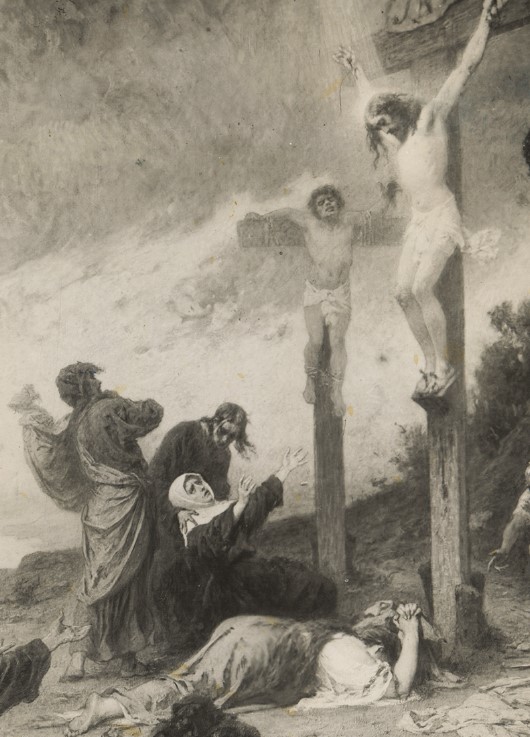FIRST, a thrilling statement of the Apostle Paul: ‘In Christ God was reconciling the world to himself, not counting their trespasses against them, and entrusting to us the message of reconciliation’ (2 Corinthians 5: 19). Think about that. The message of the Gospel is not about the appeasement of a God who is angry at our failings: it is about a God of love, in His mercy providing a way for us to be reconciled, after our failings have alienated us from Him.
Now the Apostle John: ‘If we confess our sins, he is faithful and just to forgive us our sins and to cleanse us from all unrighteousness’ (1 John 1: 9). What does that mean? We are sinners, by our nature we are unrighteous. But God wants to cleanse us from our unrighteousness. Clearly it does not mean that God will make us into sinless people, because we cannot be that (this side of God’s Kingdom). It therefore means that He will reckon us, or count us, as sinless.
Covering for Sin
After the incident of the golden calf, ‘Moses said to the people, “You have sinned a great sin. And now I will go up to the Lord; perhaps I can make atonement for your sin”’ (Exodus 32:30). What does that word ‘atonement’ mean? The Hebrew word the Bible uses essentially means ‘covering’. Its meaning is brought out in Psalm 32:1: ‘Blessed is the one whose transgression is forgiven, whose sin is covered.’ Those whose sins are covered are ‘blessed’—that is, supremely happy.
Note that the Psalmist does not say ‘blessed are all mankind’. Blessed are those who will avail themselves of the offer of atonement with God.
Jesus Christ was the divinely provided human being who, of his own free will, reversed the choices which our ancestors made in the garden of Eden (Genesis 3). He was the only one who has ever lived a perfect, sinless life. And he laid down his life, giving himself as a sacrifice on the cross (1 Corinthians 5:7). You and I have no righteousness of our own, but we can be counted as righteous. We do this by being baptised into Christ, and pursuing the vital relationship with him which is life in Christ. This is the atonement: we are then ‘covered’ by the righteousness of Christ.
Of course, none of this means that sin has ceased to matter. How much it matters to God is shown by what He did in order to provide atonement for us. The cost to the Son and the Father was awesome. But it was undertaken for each of us personally, and shows the length that the Father and Son were prepared to go to for you and me. So, sin can never be treated lightly.
Grace and Truth
This is how the Gospel of John describes the birth of Jesus Christ: ‘And the Word became flesh and dwelt among us, and we have seen his glory, glory as of the only Son from the Father, full of grace and truth’ (John 1:14). Those two words ‘grace’ and ‘truth’ reveal a great deal of God’s loving purpose. But at a simple level: if God were to ignore our sinfulness and extend unconditional grace to all humankind, the good and the wicked, that would be but a sorry foundation for eternity. If, on the other hand, grace were eliminated and only the claims of truth were pressed, there could be no salvation for anyone. But, uniquely in Jesus Christ, God wonderfully combines grace and truth, bringing His salvation to His followers by means of Jesus Christ’s sacrifice.
When we belong to Christ, we may say that when God looks upon us He sees not our unrighteousness, but the righteousness of the One who covers us. This is God’s arrangement, and it is very wonderful. And the more wonderful we see it to be, the more it calls to us for a continuing response. For example, in Matthew 5:3–9 Jesus lists seven qualities of life which contribute to ‘blessedness’. These qualities can only come genuinely by response to the atoning grace of the Lord Jesus, not by any deliberate attempts to cultivate them.
In proportion as we embrace the God- provided atonement in Christ it will awaken a response in us of worship and delight. The grace of God and of the Lord Jesus will produce gratefulness in us, affecting our outlook towards everything and everybody.
The mission of Jesus Christ is described as to ‘deliver all those who through fear of death were subject to lifelong slavery’ (Hebrews 2:15). The writer does not mean that people who are without Jesus live in constant fear of death, but that, aware that life is limited, they spend their time in a kind of slavery to the things of this life; whereas Jesus has opened up the way to new and eternal life, to which this present life is a mere brief introduction.
For believers who have been baptised and belong to Christ, life is transformed: ‘there is great gain in godliness with contentment’ (1 Timothy 6:6). They have ‘a sure and steadfast anchor of the soul’ (Hebrews 6:19).
Denis Jackson



